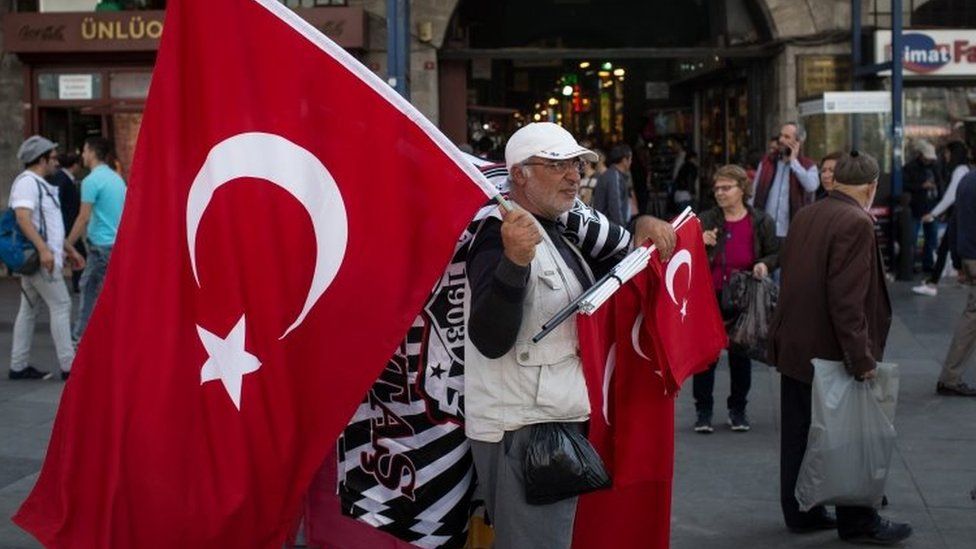EU backs Turkey visa deal, but says conditions must be met
- Published

The European Commission has given conditional backing for Turkish people to get visa-free travel inside Europe's passport-free Schengen area.
It says Turkey has made good progress on key conditions, but work remains to be done "as a matter of urgency".
The change could take effect from July, but first it requires approval by the European Parliament and member states.
The deal was offered in return for Turkey taking back migrants who crossed the Aegean Sea to Greece.
The EU fears that without it, Turkey will not control migration.
The Turkish foreign minister, Mevlut Cavusoglu, welcomed the recommendation, saying the visa proposals have opened a new page in Turkey's relations with the EU.
'Still work to be done'
The visa liberalisation deal remains controversial in a number of capitals across the EU, but the Commission praised Turkey for its progress in fulfilling its requirements, particularly in recent weeks.
Vice-President Frans Timmermans said: "There is still work to be done as a matter of urgency, but if Turkey sustains the progress made, they can meet the remaining benchmarks."
The Commission outlined several outstanding issues, with Turkey required to do more to tackle corruption and bring its laws on terrorism in line with European standards, among others.
Five benchmarks still to be met by Turkey:
- Corruption: Turkey must pass measures to prevent corruption, in line with EU recommendations
- Data protection: It must align national legislation on personal data protection with EU standards
- Europol: An agreement is to be concluded with the continent's law enforcement agency
- Judicial cooperation: It must work with all EU members on criminal matters
- Legislation on terrorism: Turkey is also required to bring its terror laws in line with European standards
The commission is also giving Turkey until the end of the year to upgrade its passports, so that they meet the latest biometric standards.
Mr Timmermans stressed that no Turkish citizen would enter the EU without a visa if they do not have a biometric passport with a facial image and fingerprint data.
He said: "I would rather have somebody at my border with a biometric passport where I can be sure that the person carrying the passport is actually mentioned in the passport, than a person with an old-fashioned passport and a paper visa."
The deal will scrap the requirement for Turks to get a three-month, short-stay Schengen visa for tourism or business trips.
Visa-free travel will apply to all EU Member States except for Ireland and the UK, and to the four Schengen associated countries - Iceland, Liechtenstein, Norway and Switzerland.
But it will not grant Turks the right to get a job in Europe.
Separate to the deal with Turkey, the Commission also proposed granting visa-free travel to citizens of Kosovo.
The tiny Balkan state declared independence from Serbia in 2008 and is still not recognised by Belgrade and five EU states.
Under the plan, Kosovans with biometric passports would be able to enter the Schengen zone without a visa and stay for up to 90 days.
Migrant crisis role
Turkey has threatened to stop taking back migrants from Greece if the EU fails to deliver on visa liberalisation.
The large influx of migrants and refugees arriving in Europe from Turkey, and from North Africa, has caused a political crisis among EU states.
Under the EU-Turkey agreement, migrants who have arrived illegally in Greece since 20 March are to be sent back to Turkey if they do not apply for asylum or if their claim is rejected.
For each Syrian migrant returned to Turkey, the EU is to take in another Syrian who has made a legitimate request.
Parliament's concerns
The deal will now be sent to the European Parliament, which has already said it will not vote on the proposal until the Commission confirms all of the conditions have been met.
Concerns have been raised in Parliament before that the visa-waiver looks like a reward for Turkey, because of its co-operation in the migrant crisis. It says Ankara falls short of many EU human rights benchmarks.
MEPs accept that Turkey is a "key strategic partner" for the EU. But they say reforms have slowed down in Turkey in many areas, including freedom of speech and judicial independence.
MEPs have also voiced concern about continuing fighting in south-eastern Turkey between government troops and Kurdistan Workers' Party (PKK) rebels, whom the government in Ankara describes as "terrorists".
A note on terminology: The BBC uses the term migrant to refer to all people on the move who have yet to complete the legal process of claiming asylum. This group includes people fleeing war-torn countries such as Syria, who are likely to be granted refugee status, as well as people who are seeking jobs and better lives, who governments are likely to rule are economic migrants.
- Published4 May 2016